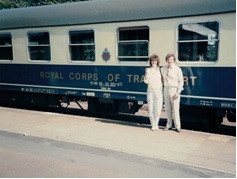A Word from the CHAIR
Hello colleagues,
I do hope you and your families are keeping well and had an enjoyable Christmas and New Year. We held our final Bristol Group meeting of the year on Thursday 7th December at the Toby Carvery in Bradley Stoke for our pre-Christmas gathering. The meeting was well attended by 11 members followed by the now usual Carvery lunch. At this meeting we reflected for a few moments on the sad passing of Bill Casling, a long-standing and valued member of our committee on 3rd November, whose funeral was held at the Woodlands Memorial Park near Thornbury on 18th December. A Working Group set up by the Executive Council, should be making recommendations on a revised AGM format in April 2024. Our next meeting is our 2024 AGM on Thursday 14th March.
Bristol Group AGM 2024 The Bristol AGM will take place on Thursday 14th March at the Toby Carvery Bradley Stoke commencing at 11am sharp. Lunch will follow the meeting.
Finances remain in good shape so we can provide a small subsidy towards the cost of a standard carvery lunch. It was agreed in December that members should now contribute £5 towards the costs of the main meal plus a further £5 if they wish to add a desert and/or tea/coffee to the meal. Payment on the day.
David Luxton Deputy General Secretary and Les Calder our regional representative will be attending. David and Les formed part of the working party reviewing the Group and Regional structure as well as being party to future AGM discussions and it will be interesting and useful to have an update on progress so far.
At the AGM, the group accounts for 2023 will be formally presented. They are now complete and auditing will follow at the end of January. They are still in good shape but donations towards costs are always welcome. If you wish to donate towards the Groups running costs please send to Group Treasurer as below: -cheques etc. (payable to CSPA Bristol Group),
GC 949 Review of AGM format and Group representation – has been sent to those on the groups email lists as we need to get your views at the AGM in March.
Officers and Committee for 2024.: – Stuart Tarr, is currently CHAIR; Colin Fender, Membership Secretary and Treasurer. We need volunteers to fill the vacant post of Secretary and we have sadly lost a ‘committee’ member.
Please let Colin Fender know if you will be attending the AGM and lunch by Wednesday 6th March.
As we are now in a period of ‘calm before the storm’ – of general election mayhem and false promises we have two contrasting articles from group members which are both interesting and informative. Martins article makes you realise what an interesting and sometimes-contrasting career the civil service can give and Susan’s article is a heartening report of a fund-raising event in support of Alzheimer’s research.
A Tour of Foreign Tours- Part 2 – Martin Robertson
Berlin was, and remains, to this day a fascinating city. Wide, straight boulevards radiate from the city centre with museums, art galleries and other points of interest all well served by cheap public transport. I have lived and worked in 4 major capital cities during my career and if I had to choose again, Berlin would be top of my list. My wife and I lived in a comfortable apartment, quite literally in the shadow of the 1936 Olympic Stadium which had been commandeered by the British Army after the second world war to become the British Military Government headquarters.
Our apartment overlooked the hockey pitches and my office was part of the wrestling ring complex! My team maintained the BFBS radio and TV transmitters, the BBC world service relay and a host of military communications networks to serve the military population and to provide links back to West Germany, including radio communications along the road and rail corridor (pictured a younger man and wife alongside the Royal Corps of Transport train) to Helmstedt (Checkpoint Alpha) in Lower Saxony. On one trip up into the roof space of the stadium I discovered a box of tourist maps left over from the 1936 games showing the city without the wall that surrounded us – how I now wish I’d kept a few copies – but I didn’t. Someone asked me did we spy on the Russians? Of course, we did, both overtly and covertly but that’s another story.

By late 1985 a new city beckoned;: the UK Ministry of Defence had set up several military teams in Saudi Arabia including one to help the National Guard build its communications network across the vast empty spaces of the desert kingdom. I was to be the site engineering inspector for the dozens of installations dotted mainly around the perimeter of the country.
My wife and I packed our bags (again) and flew to Riyadh, a growing city of less than 1 million population and still very ‘third world’ in many respects. Before flying out we had bought several books about expatriate life in Saudi so the culture shock wasn’t as traumatic as it could have been. Our first accommodation was a bit basic and isolated but as luck would have it our support staff couldn’t contact the Egyptian landlord to renew the lease so after a while we were moved to a luxurious compound owned by the Shell oil company with a big swimming pool, several tennis courts and well-maintained gardens. As expected the heat was absolutely roasting but the books didn’t warn us of the burning door handles on metal car doors, or steering wheels that couldn’t be touched at all without first running the car’s air conditioning for 5 minutes, or the absolute impossibility of walking any distance anywhere.
The shops were an eclectic mix of modern air conditioned, marble lined temples of commerce and open-air souk market stalls selling spices and clothing that probably hadn’t changed much in hundreds of years. Women were not allowed to work, except as nurses and teachers, and none were permitted to drive. However, my wife found a job in kindergarten looking after children from a wide range of nationalities. As with many activities in life the Saudi authorities usually turned a blind eye to women working in some roles but it created a comic parallel reality at the women only Princess Nourah University where the maintenance men only existed in an underground tunnel network popping up to repair and maintain things at night before disappearing below again. Weird, or what? Contact between men and women outside of the family circle was strictly forbidden but occasionally we were invited as a team with our wives to attend big events such as the annual camel races where our Saudi hosts treated us like minor royalty. In the mid 1980’s the jockeys were velcro’d into the saddles as camels don’t have a smooth gait like a horse, but when I returned in 2015 technology had taken over and the human jockeys had been replaced by wireless controlled mannequins. The team I worked with comprised mainly British army officers drawn from the Royal Corps of Signals and they had access to Adventure Training Funds. Together with the military staff I took part in two sponsored expeditions within Saudi Arabia using Land Rovers which, in my opinion, were the best desert bashing vehicles available at the time. Our first expedition was to trace part of the route traditionally taken by Muslim pilgrims travelling between Baghdad and Mecca – the Hajj. A testing journey of a week or more before the advent of mechanised transport. Our aim was to discover and record some of the rest houses and water cisterns which had existed along the route but had been lost in recent decades.

We plotted our route carefully and with some searching on foot we found two archaeological remains which we measured, photographed and plotted using our incredibly bulky but novel and very useful LORAN receivers – LORAN was a forerunner of GPS. We passed our findings on to the University of Riyadh. Our second expedition followed the route of the Hejaz railway from Medina to the Jordanian border.
This was the railway that T E Lawrence famously attacked in the first world war to disrupt the Turkish supply lines. Although most of the rails and sleepers had been removed in the intervening 70 years, much of the route was still clearly discernible and to our astonishment there were wrecks of locomotives and wagons still laying where T E Lawrence had ambushed them all those years ago. The desert air is so dry that corrosion is rare, but the sand laden desert wind had stripped all the paint off.
After the expedition I gave an illustrated talk to a group of American desert ramblers along with our team leader, a Brigadier with a very British sense of humour. One of the Americans asked; “Brigadier, what was your role in the expedition?” “Ah,” said the Brigadier with a wry smile “I was there to decide who we should eat first if we became stuck.” We weren’t invited back.
With no English language TV to keep us out of mischief we made our own entertainment and our own ‘refreshments’ to go with the frequent BBQs and desert camp outs. There were dozens of recipes for home brew wine and beer, some passable, some downright unpalatable but we drank it anyway. Camping in the desert was a memorable experience with views of the stars at night unspoiled by any nearby lighting or cloud cover, and I really enjoyed the absolute silence.
Work was interesting enough with a lot of travel to the far-flung outposts of the National Guard empire. Some stations were on the Iraqi border guarding the Trans Arabian (TAP) oil pipeline and watching over the unofficial (smuggling) road routes to and from Iraq, while in the far southern mountains the ancient town of Nejran stood on one of the few high passes between Saudi Arabia and the Yemen.
I’ve never really understood the geo-politics of the region and I seriously goofed when a few years later I was based back in London and was asked to brief an RAF Wing Commander who was being posted to Dhahran on the Persian Gulf coast. “You’ll have a nice quiet time of it” I said, “Lots of swimming, sailing, desert expeditions.” Only three or four weeks later Iraq invaded Kuwait and the very northern tip of Saudi Arabia. When I next saw him the Wing Commander told me my crystal ball was 100% defective as he was up to his eyeballs in preparation for Gulf War One which was only weeks away. Ah well, you can’t win them all.
You’re Never Too Old
Last December whilst on a short stopover (yes – another cruise!!) in San Sebastian, La Gomera (Canary Islands) we were enjoying a walk around the harbour when we happened to see a poster advertising the World’s Toughest Row – the Annual Trans-Atlantic Rowing Race due to depart from La Gomera for Antigua, fairly imminently (target 14th February)
39 teams were entered varying in size from solos to a team of five (all Brits), and include rowers from all over the world, with one thing in common – a desire to achieve the seemingly impossible and take on the Atlantic Ocean!
The boats average just 8 mtrs. in length and just under 2 mtrs. wide with little protection against storms and crashing waves. All the boats are equipped at the start but, once the race is underway, they are on their own, unsupported, unable to receive any help or take food from any other vessels at sea. Throughout the 3000 mile journey the crews will battle 40-foot waves, seasickness, storms and sweltering heat. Rowing in excess of 12 hours a day, crews will push their endurance, but it is their mental fortitude, physical stamina and technical ability that will mark their life-changing achievement when they step ashore in Antigua. 26 of the 39 teams entered were either British or had a British contingent in the crew. Quite a few crews were females, including a young woman from Bath, so this is not just a race for men!
We were intrigued, so decided to walk around to see these, surprisingly small row boats and talk to their crews and relatives. I’m only going to write about two of these crews. The winners – and Frank Rothwell, who is rowing solo. This is Frank’s second row – he came second in the solo class last time and he is rowing for Alzheimer’s Research, a charity close to my heart.
Firstly: (late January) “Frank currently has an ETA suggesting the second half of February, but he really wants to make landfall by February 14th as a Valentine’s dinner with his wife Judith seems to be appropriate when you row the Atlantic Ocean twice! Like last time, Frank rowed across the Atlantic he isn’t sending much content back to shore support, (read; Nothing!) so we will have to wait until Frank is back on dry land to see the wonders of the Atlantic from his perspective. Communication is great though in terms of the safety teams checking in and all is in hand on board the boat ‘Row for a Cure’.”
Why am I writing about Frank?
Well – he is 73 years old! This is his second Trans-Atlantic Row. We asked if he had been a rower all his life – but NO, he started rowing only four years ago, with the intention of entering this race to raise funds for Alzheimer’s Research! What a remarkable man. As I’m writing this – late January- Frank is still rowing! In Frank’s own words: I’m a big believer of living life with no regrets. Which is why at 76, I’m rowing across the Atlantic to raise another £1 million for Alzheimer’s Research UK. But this time, I’m rowing for a cure.
I have galloped around 11 marathon courses, trudged up Kilimanjaro, skippered my own boat around the world, navigated the Northwest passage and around Cape Horn during my circumnavigation of North and South America and I cursed and swore my way through Channel 4’s The Island with Bear Grylls.
Since my last row, I bought my beloved hometown football club, Oldham Athletic, saving it from extinction and in November 2022, I survived major heart surgery. I’m not afraid of death. But I am afraid of getting dementia as well as my brother-in-law, Roger, I recently lost a good friend to dementia. It’s devastating. I don’t want anyone else to go through it. That’s why I’m raising as much awareness and money as I can for Alzheimer’s Research UK. If you would like to donate, please visit my JustGiving page and Iceland Foods Charitable Foundation will double it up to £100,000. Thank you!
Secondly:
WINNERS of the World’s Toughest Row – Atlantic 2023 🏆“🇬🇧HMS Oardacious, our incredible five-man team of British submariners, blazed across the finish line, on Wed 17thJanuary, with an incredible time of 35 days, 4 hours, and 30 minutes, after 35 gruelling days at sea!! “Well done to all who have and will finish.
I don’t think this is an activity for me though – I’ll stick to dry land and Short Mat Bowls!
Sumac.
We look forward to seeing as many as possible at the AGM in March
Contact details: Stuart Tarr, CHAIR; stuart.tarr@hotmail.co.uk
Colin Fender, Group Treasurer, CSPA Bristol Group, Flat 304, Stoke Gifford Retirement Village, Edward Parker Road, Bristol, BS16 1YF – Tel: 0117 969 4752, email: colinfender@btinternet.com
